The Best BBQ Fuels
By: Arsal Sher of Fire Pit Surplus
Ah, the art of BBQ – it's more than just cooking; it's a ritual that transforms your backyard into a stage for culinary masterpieces. The secret ingredient? It's not just what's on the grill, but what's fueling the fire beneath it. Choosing the right BBQ fuel is akin to selecting the perfect spice blend – it can elevate your grilling from good to unforgettable.
Whether you're a seasoned pitmaster or a weekend grill enthusiast, the fuel you choose plays as big of a role in how your barbeque turns out as your choice of grill does. From the quick convenience of propane to the authentic smokiness of hardwood, each fuel type brings its own character to the feast.
In this guide, we'll explore the various BBQ fuels that can enhance your grilling efficiency, flavor, and overall experience. Remember, the best choice is one that resonates with your personal taste and cooking style. Let's fire up the grill and dive into the world of BBQ fuels!
Charcoal: The Heart of Traditional Grilling
In the realm of BBQ, charcoal stands as the time-honored fuel, embodying the essence of traditional grilling with its rich, smoky aroma and the primal joy of cooking over an open flame. Let's delve deeper into the two main characters in the charcoal saga: Lump Charcoal and Briquettes.
Lump Charcoal: The Purest Flame
Lump charcoal, the original BBQ fuel, is celebrated for its ability to ignite quickly and reach searing temperatures in no time. Crafted from pure hardwood without any additives, lump charcoal offers an unadulterated, smoky flavor that can elevate the taste of your grilled foods to new heights.
- Benefits: Its high heat capability makes it perfect for grilling steaks, allowing for a beautiful sear that locks in juices. The minimal ash production also means easier cleanup, making your grilling experience as convenient as it is delicious.
- Choosing Quality: When selecting lump charcoal, look for bags that specify the type of hardwood used. The wood variety can subtly influence the flavor profile of your food, from the mild sweetness of applewood to the robust intensity of hickory. Opt for charcoal that's free from chemicals and fillers to ensure a pure, clean taste.

Briquettes: The Consistent Burner
Briquettes, with their uniform shape and size, are engineered for convenience and consistency. They provide a steady heat source that's ideal for longer cooks, ensuring your briskets and ribs are cooked to perfection.
- Uniformity and Ease of Use: The predictability of briquettes makes temperature control a breeze, allowing even novice grillers to achieve professional results. Their uniform size also facilitates better airflow, ensuring a consistent burn throughout your cook.
- Debunking Myths: Modern briquettes have come a long way from their predecessors. Today's high-quality briquettes are made with natural binders and do not contain harmful chemicals. This advancement means you can enjoy the convenience of briquettes without compromising on flavor or health.
Whether you're drawn to the pure, intense heat of lump charcoal or the reliable, even burn of briquettes, charcoal grilling offers a connection to the age-old tradition of cooking with fire. By choosing the right type of charcoal and understanding its unique qualities, you can master the art of BBQ and impress your guests with flavors that only traditional grilling can provide.
Remember, the key to unlocking the full potential of your charcoal grill lies in selecting high-quality fuel. Whether it's the quick-lighting, high-heat prowess of lump charcoal or the steady, enduring flame of briquettes, the right choice will enhance your grilling experience, imbuing your meals with the unmistakable essence of outdoor cooking.
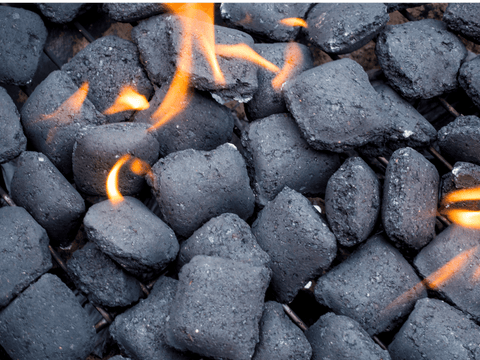
Wood: For the Love of Smoke
Venturing into the world of wood as a BBQ fuel is like opening a door to an aromatic garden of flavors. Each type of wood, from fruit woods to hardwoods and even specialty woods like binchotan, carries its own unique essence, ready to infuse your meats with layers of smoky goodness. Let's explore the rich tapestry of wood fuels and how they can transform your BBQ into an authentic smokehouse experience.
Types of Wood Fuels
- Fruit Woods: Known for their mild and subtly sweet smoke, fruit woods like apple, cherry, and peach are perfect for enhancing the natural flavors of pork, poultry, and even fish without overwhelming them. These woods are the go-to for those seeking a delicate smokiness that complements rather than competes with the flavor of the food.
- Hardwoods: For a more pronounced smoke flavor, hardwoods such as hickory, oak, and mesquite offer a robust profile suitable for beef and game meats. Hickory imparts a strong, bacon-like flavor, oak provides a medium smoky taste that works well with a variety of meats, and mesquite, with its intense and earthy notes, is ideal for shorter cooks where a bold smoke is desired. Pecan is similar to hickory in that it's very versatile, being a common wood for pork, beef, chicken, and more.
- Specialty Woods: Binchotan, a Japanese white charcoal made from oak, burns hot and clean, offering a unique way to grill with minimal smoke, preserving the natural flavors of the food. Its high heat and long burn time make it a prized fuel among grilling aficionados seeking precision and purity in their cooking.
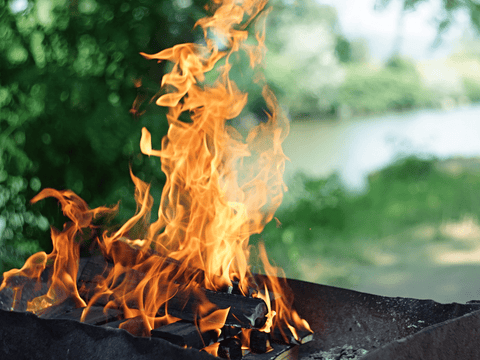
Pellets and Wood Chips
For those who love smoking but crave the convenience and consistency of modern technology, wood pellets and chips offer a solution. Pellets, made from compressed wood chips and sawdust, provide a steady burn and are available in a variety of wood types, allowing for precise flavor pairings with different meats. Chips, on the other hand, are great for adding a quick burst of smoke to grills and smokers alike.
- Pairing Wood Types with Meats: The secret to achieving authentic flavors lies in matching the right wood with the right meat. Use fruit woods for a gentle touch on lighter meats, hardwoods for a deeper smoke on red meats, and specialty woods like binchotan for high-heat grilling that focuses on the food's inherent flavors.
By embracing the diversity of wood fuels, you can elevate your grilling game to new heights, experimenting with different combinations and discovering the perfect smoke profile for every dish. Whether you're slow-smoking a brisket over oak or searing scallops over binchotan, the right wood can make all the difference, turning your backyard BBQ into a gourmet smokehouse.
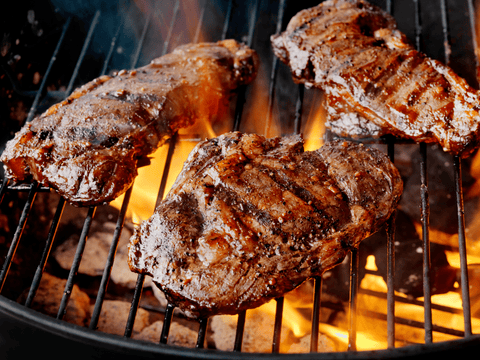
Gas and Electric Grills: Modern Convenience
In the fast-paced world of today, convenience in cooking is a treasure, and when it comes to BBQ, gas and electric grills are the jewels in the crown. These modern marvels offer a blend of ease and efficiency that traditional fuels can't match, making them a favorite among urban dwellers and busy families alike.
Propane and Natural Gas Grills: For those who value simplicity and speed, propane and natural gas grills are a godsend. With the turn of a knob, you're granted instant control over the temperature, allowing for precise cooking without the guesswork. Cleanup is a breeze, too, with minimal ash and residue to deal with post-cookout. These grills are perfect for the grill master who wants to focus on the food and the company, not on maintaining the fire.
Electric Grills: Not everyone has the luxury of a spacious backyard or the ability to use open flames, especially in city apartments. Enter electric grills, the solution for space-restricted or regulation-bound grill enthusiasts. While they may not offer the traditional smoky flavor, electric grills can produce deliciously grilled dishes from the comfort of your kitchen or balcony, ensuring that no one misses out on the joy of grilling.
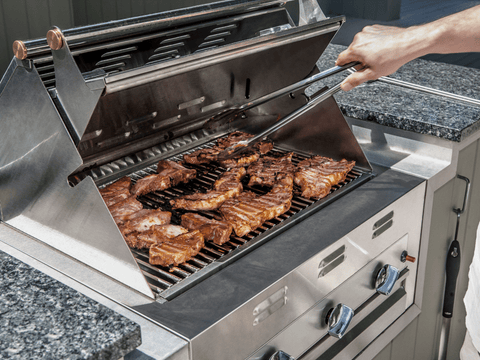
Innovative and Sustainable Fuel Options
As we become more conscious of our environmental footprint, the quest for eco-friendly and sustainable BBQ fuel options gains momentum. The BBQ world is responding with innovative solutions that promise a greener future without compromising on taste or experience.
- Recycled Wood Briquettes and Organic Charcoal: Made from compressed sawdust and waste wood, these briquettes offer a sustainable alternative to traditional charcoal. Organic charcoal, produced from sustainably sourced wood, provides a cleaner burn, reducing the impact on the environment.
Biodegradable Briquettes and Pellets from Invasive Species: The latest in BBQ fuel innovation includes biodegradable briquettes and pellets made from invasive plant species. This not only helps in managing ecological threats but also provides a sustainable fuel source for eco-conscious grillers.
Hybrid Grilling: Combining Fuels for the Perfect Cook
Why choose one when you can have the best of both worlds? Hybrid grilling, the practice of using multiple fuel sources, is gaining popularity among grillers seeking to achieve specific cooking temperatures and flavors. This approach allows for the convenience and control of gas with the authentic smokiness of wood or charcoal.
- Tips for Managing a Hybrid Grill Setup: Starting with a hybrid grill setup can seem daunting, but with a few tips, even beginners can master the art. Begin by using gas or electricity for consistent heat and add wood chips or chunks for that smoky flavor. Experiment with different wood types and quantities to find the perfect balance for your taste.
Hybrid grilling, along with innovative and sustainable fuel options, represents the evolving landscape of BBQ. By embracing these modern conveniences and eco-friendly alternatives, we can enjoy the timeless tradition of grilling in ways that are both satisfying and responsible.
FAQs
Q: Can I switch fuel types on my grill? A: Yes, but it depends on your grill's design. Check your grill's manual for compatibility and safety guidelines. Accessories like smoker boxes can help adapt your grill for different fuels.
Q: What's the environmental impact of charcoal vs. gas grills? A: Charcoal has a higher carbon footprint, but sustainably sourced options can lessen the impact. Gas grills burn cleaner with lower emissions, and electric grills are the most eco-friendly, especially if powered by renewable energy.
Q: Can wood pellets be used in a charcoal grill? A: Yes, with a pellet smoker box or tube to prevent them from falling through the grates, allowing for wood-smoked flavors in your charcoal grill.
Q: Are there eco-friendly BBQ fuel options? A: Absolutely. Look for briquettes made from recycled wood, organic lump charcoal, and pellets from sustainable sources or agricultural byproducts for greener grilling.
Q: How do I choose the best fuel for my cooking style? A: Consider your priorities (flavor vs. convenience), the foods you grill, and your preferred cooking methods. Experimenting with different fuels can help you find your ideal match.
Q: Can electric grills produce a smoky flavor? A: Yes, by using smoker boxes with wood chips or liquid smoke products, you can add a smoky flavor to foods grilled on an electric grill.
Conclusion: Finding Your Flame
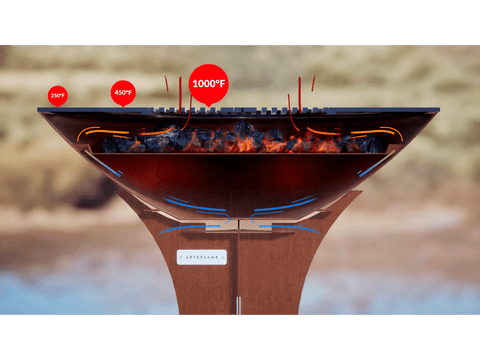
In the world of BBQ, the quest for the perfect flame is a personal journey. Each type of fuel, from the rich smokiness of charcoal and wood to the sleek convenience of gas and electricity, offers a unique path to mastering the art of grilling.
Embrace the adventure of experimentation. The right fuel for you is the one that matches your taste preferences and grilling style, enhancing the joy of cooking outdoors. Remember, every pitmaster's journey begins with a spark—a desire to explore the flavors and experiences that only grilling can offer.
So, light up your grill of choice (here’s what we recommend), experiment with different fuels, and discover the satisfaction of creating mouthwatering meals that reflect your culinary identity. Here's to finding your flame and savoring the journey along the way.
Happy grilling!







